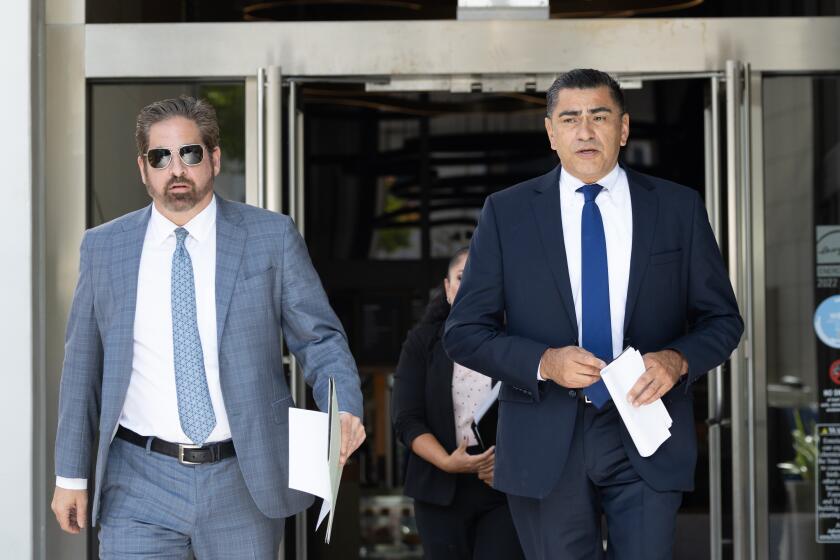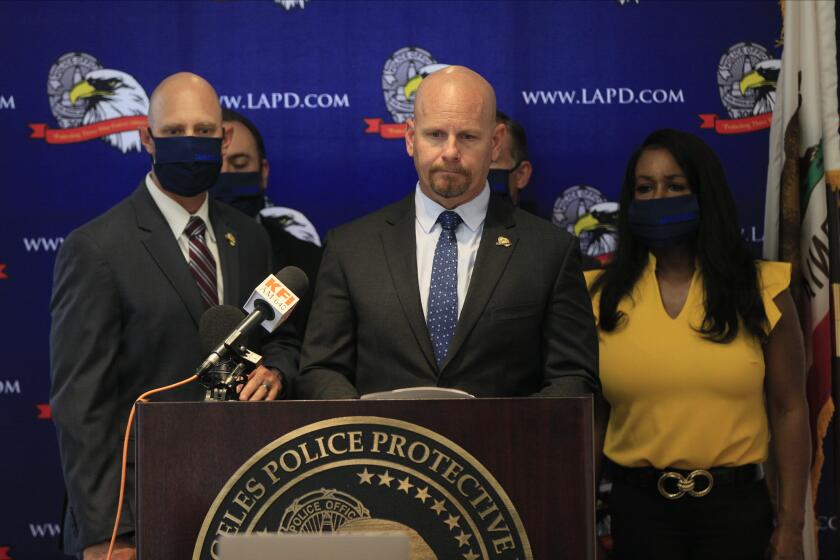A top detective alleges the LAPD is toxic toward women. Will her lawsuit bring change?

- Share via
- In a whistleblower lawsuit filed this year, a detective claimed the LAPD retaliated against her. She alleges she was demoted, reassigned and put under internal investigation in the span of a few months.
- Tackling persistent sexual harassment complaints will be among the pressing issues facing incoming LAPD Chief Jim McDonnell.
- Since 2019, the city of Los Angeles has paid out at least $11 million in damages for cases of discrimination, retaliation and other workplace strife based on gender brought by LAPD officers, according to a Times review of data obtained through a public records request.
Even as a young street cop trying to work her way up the ranks of the Los Angeles Police Department in the mid-90s, Kristine Klotz says she was quick to call out sexism on the job. Right is right and wrong is wrong, she used to tell herself, knowing that she would ruffle some feathers in the process.
So she didn’t hesitate to speak up last summer when she learned that a male supervisor in the vaunted Robbery-Homicide Division where she worked had allegedly compared female detectives to sex workers on Figueroa Street.
To make it in the LAPD, department veterans say, you need a thick skin. But Klotz, 54, alleges the Figueroa comments were just the tip of an iceberg of verbal abuse women in the unit faced.
Klotz said that after repeated complaints about her mistreatment at the hands of department officials went ignored, she and another female Robbery-Homicide detective reached out for help from the Board of Police Commissioners, the LAPD’s civilian oversight body. For weeks, they heard nothing.
A response eventually came, just not the one Klotz expected.
In a whistleblower lawsuit filed this year in Los Angeles County Superior Court, Klotz claims the LAPD retaliated against her. She alleges she was demoted, reassigned and put under internal investigation in the span of a few months.
The lawsuit accuses several current senior LAPD officials, including Deputy Chief Marc Reina, and Capts. Scot Williams and Robin Petillo of inflicting emotional distress and creating a hostile work environment. The suit names two women, Petillo and Lt. Blanca Lopez; the rest of the defendants are men. A follow-up letter to the Police Commission names the supervising detective who allegedly made the Figueroa comments, Christopher Marsden.
Emails from The Times to the work accounts of the officials singled out in the suit went unreturned.
The LAPD said it doesn’t discuss pending litigation and referred questions to the city attorney’s office, which didn’t respond to an email seeking comment. A private law firm that is representing the defendants, including the city, has asked a judge for more time before responding to Klotz’s suit in court.
A 29-year department veteran with a long list of high-profile criminal investigations to her name, Klotz said she had no choice but to turn to the court system while fighting to restore both her career and reputation. The months-long ordeal, she said, “opened my eyes to a completely different way of thinking when there was so much pride I had in this organization.”
Tackling persistent sexual harassment complaints will be among the pressing issues facing incoming LAPD Chief Jim McDonnell, who was appointed to the job this month, pending City Council approval. He will also be expected to overhaul a disciplinary system that some argue seems to penalize the accuser more than the accused.
The decision to select McDonnell, who was an LAPD officer before serving as L.A. County sheriff, comes after a months-long search by Mayor Karen Bass.
Since 2019, the city of Los Angeles has paid out at least $11 million in damages for cases of discrimination, retaliation and other workplace strife based on gender brought by LAPD officers, according to a Times review of data obtained through a public records request. That figure doesn’t include at least $12 million in damages awarded by juries to women at the LAPD that the city is appealing after having been defeated in court.
In addition, a dozen or so cases involving complaints by female officers about harassment and discrimination are pending. Several claims have previously gone unreported, including a sergeant who says she was denied a transfer in “direct retaliation” for cooperating with an Internal Affairs investigation into a former assistant chief accused of planting a tracking device on the car of his former domestic partner, a fellow LAPD officer.
Alfred “Al” Labrada, a onetime assistant chief, was found guilty of seven charges, including lying to internal investigators, sources say.
In another case, an auto theft detective says she was tormented by a male colleague after their relationship fell apart. And in the Hollenbeck Division, which has seen investigations and leadership changes in recent months, several sworn and civilian female employees alleged they faced retaliation for reporting misconduct.
While some longtime LAPD observers argue that decades of damning reports and court orders have forced the department to confront the problem, others, including civil rights attorney Connie Rice, say a crude, misogynistic culture still exists and women in uniform continue to face obstacles to advancement.
Much of the abuse has moved online to pro-LAPD social media groups that feature a “frat-boy sort of MAGA misogyny thing going on,” she said.
“I think that the DNA of the culture is still ‘Women shouldn’t be here,’” Rice said. “There’s not a welcome mat, it’s more like a no-trespassing mat.”
Toward the end of her time at Robbery-Homicide, Klotz said, she felt as though she had a target on her back.
Klotz contends that she was ordered to perform menial tasks and forced to check in whenever she left the office, much like a high-schooler requesting a hall pass. If she stepped away to rinse out her coffee mug or use the copier, she said, her supervisor would text her demanding to know where she was. Then one day last summer, she showed up to work to find that she had been barred from a section of LAPD headquarters.
Determined not to take the humiliation “sitting down,” Klotz and a colleague, Det. Jennifer Hammer, wrote a letter to the Police Commission in September 2023 asking it to intervene in “the recent harassment, discrimination, and retaliation she and other female officers had endured.”
“The misconduct has not stopped and has increasingly worsened,” the letter said. Hammer has filed her own complaint against the department.
Klotz has been the subject of at least two internal investigations. She says the complaints against her — one for allegedly making an inappropriate gesture to another officer and the other for accosting a civilian employee — were “fabricated” as a way of punishing her for speaking out.
For the record:
4:25 p.m. Oct. 15, 2024A previous version of this article reported that LAPD Det. Kristine Klotz was demoted in January to a lower-ranking position and sent to an auto theft unit. Klotz was reassigned to a crimes against persons unit.
In January, she was demoted to a lower-ranking detective position, sent to crimes against persons unit in the San Fernando Valley. She took an 18% pay cut and now reports to a younger detective previously under her command.
Even after years on the job, Klotz has maintained her uncommonly cheerful manner. But her jaw clenches and voice thickens with emotion when she describes the humiliation she felt walking into the Van Nuys police station for the first time earlier this year, and feeling the stares from her colleagues.
The last few months have taken a heavy mental toll, she said. She started smoking again, nearly a decade after quitting cold turkey. More than once, she said, she has broken down and cried in her car outside of work.
“I didn’t think at the end of my career I would be subjected to the ongoing harassment, the retaliation that I have endured by upper management and command officers,” Klotz said.
Growing up in Long Beach on a steady diet of “Charlie’s Angels” reruns, Klotz dreamed of going into law enforcement from an early age. A high school class on courts and the law further piqued her interest. She said she had job opportunities at other area departments in her early 20s, but she held out for an offer from the LAPD.
Her dream was always to work her way up to detective, preferably investigating murders. She eventually achieved her goal, joining a Valley-area homicide unit. That led to her first encounter with what she alleges is a toxic culture.
Before blowing the whistle at Robbery-Homicide, Klotz was among a group of female detectives who sued over what they described as a frat-like atmosphere in the Valley, where some male colleagues were vulgar and abusive toward women in the office.
Klotz and other women said they were routinely referred to as “tourists” who didn’t belong. One male detective allegedly boasted of sexual exploits with the wife of a now-deputy chief and was accused of sending an inappropriate email from his work account to a female Los Angeles County deputy district attorney.
The city has denied the allegations raised in the suit, which remains under litigation.
Jamie McBride, director of the union for most rank-and-file Los Angeles Police Department officers, faces multiple internal investigations related to his company, Watermark Security.
Klotz said the experience in that case taught her to document everything, including the numerous pleading emails she sent to department higher-ups asking them to intervene at Robbery-Homicide.
Like other women who have reported misconduct, she said she has mostly learned to tune out the office gossip and rumors about her demotion. Some of the grapevine talk has gotten back to her — how she’s a loose cannon or stirring the pot to cover up for complaints accusing her of misconduct.
None of it is true, she says. And she’s not looking for a payday either, she says, rebutting another common criticism of department whistleblowers.
Corinne Bendersky, a UCLA professor of management and organizations who studied work culture across city of Los Angeles departments, said the poor handling of complaints by women and ethnic minorities is not isolated to the LAPD.
“Race relations are worse in the Police Department, gender relations are worse in the Fire Department,” said Bendersky, who performed surveys, focus groups and interviews with thousands of city employees. She said the surveys revealed strong resentment across gender and racial lines toward the Police Department’s ongoing efforts to hire more women and officers of color.
Klotz said the department conducted investigations into her complaints and deemed them unfounded, despite evidence she presented that she was the subject of retaliation for reporting misconduct committed by higher-ups.
Last week — after The Times inquired about her case — Klotz met with Deputy Chief Emada Tingirides. Klotz says she was informed that she was being returned to her previous detective rank, which restores her pay. She remains stationed in the Valley, investigating crimes against persons .
As leaders consider LAPD discipline reforms, an analysis of board of rights hearings showed a handful of civilians were picked to serve over and over.
She is planning to retire at the end of the year, but Klotz said she will continue to fight in court to bring accountability after years of the LAPD failing to improve itself.
“The damage is done, they have harmed me and they can never take it back. They will never be able to repair me,” she said before her old rank was restored. “They’ve ruined me at the end of my career.”
More to Read
Sign up for Essential California
The most important California stories and recommendations in your inbox every morning.
You may occasionally receive promotional content from the Los Angeles Times.














